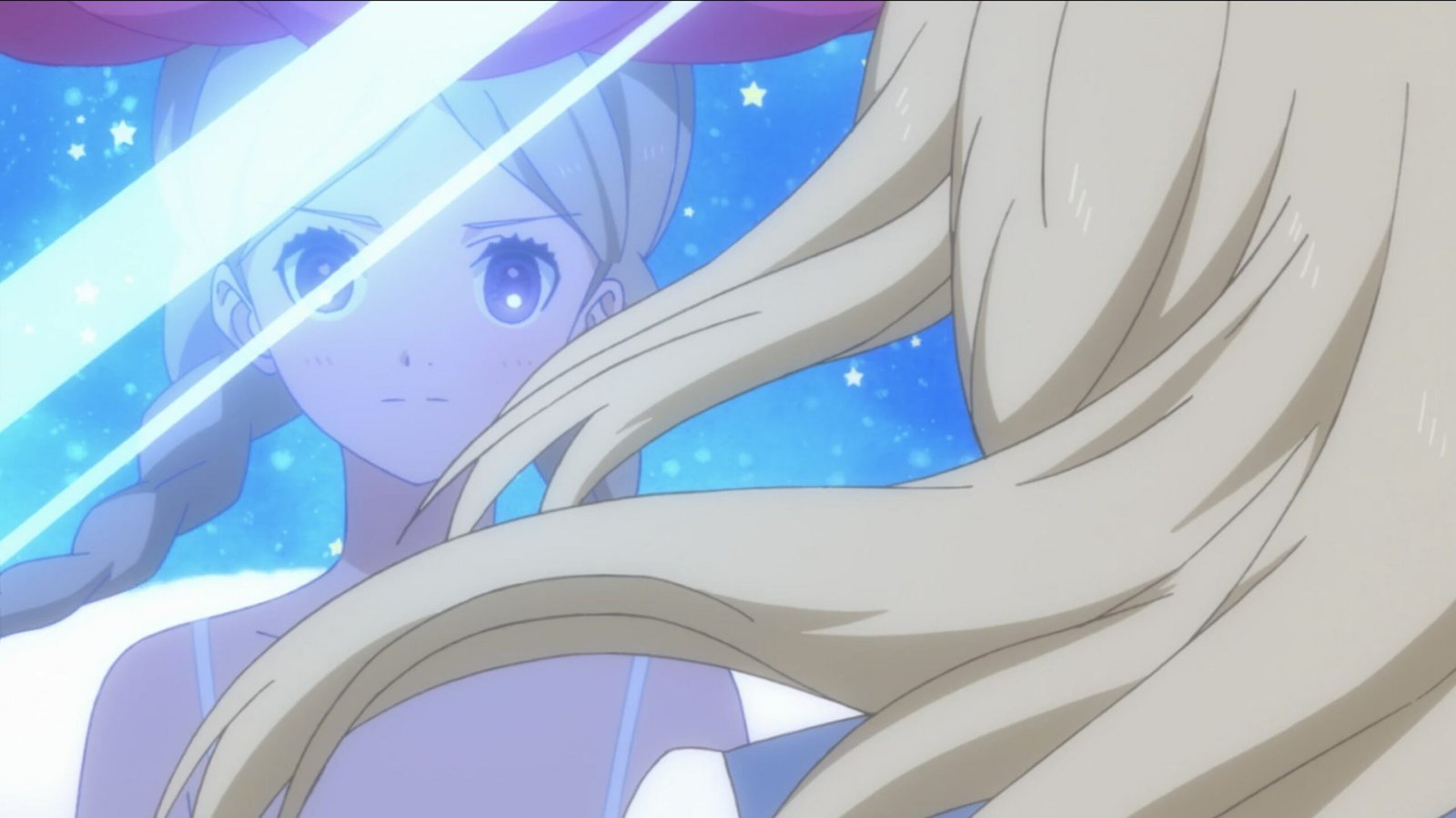
Content material Warning: Dialogue of queer/transphobia (together with slurs), on-line and office harassment, grooming, systemic violence
Spoilers for Yurikuma Arashi, referenced spoilers for Puella Magi Madoka Magica
“That is the character of methods: the second you reject them, you might be pressured to comprehend that they’re the very floor you’re standing on.”
–Ikuhara Kunihiko
Two bears are introduced with a alternative: will you be invisible, or will you eat people? They appear like teddy bears, and they’re on trial. Two lady bears–two lesbian women–Ginko and Lily, standing earlier than three male judges deciding whether or not or not they need to have the fitting to exist. With a view to have their love authorized, they declare: they may eat people. They rework, taking up human type as they don hypersexualized bear lady outfits, and so they enter the world of the varsity.
Yurikuma Arashi locations this unusual set-piece in direction of the center of its first three episodes. It exemplifies the present’s fashion, advised as it’s in enigmatic parables. Ostensibly, Yurikuma is a couple of human lady named Kureha in search of solutions in regards to the deaths of her mom and girlfriend whereas getting right into a love triangle involving the 2 bears who’ve infiltrated her faculty disguised as people.
Nevertheless, all the things in Yurikuma Arashi is extra image than literal illustration, and I’ve usually mulled over its which means as I’ve navigated getting into the educating occupation as a nonbinary Chinese language particular person. Just like the bears, I’ve usually requested myself: what do I sacrifice to be allowed to exist throughout the faculty?

I’ve beforehand likened the method justice-minded educators undergo as being like that of turning into a witch in Madoka Magica: like a magical lady, you begin from a place of believing your self to be an agent of change, usually inside an explicitly feminized place; then you might be assimilated into the very function that brutalized you, simply because the magical lady would turn into a witch.
I’m on this essay in a unique means of turning into a monster: the method of casting out, the ways in which methods police themselves and cull the herd. I’m within the means of turning into the sort of “predator” instructor that winds up on Libs of Tiktok. I’m curious about what Jules Gill Peterson calls “trans feminization”–how, at a earlier faculty I taught at, I as a nonbinary particular person went from being seen largely as a cis man and made invisible to turning into a “tranny” and made a predatory goal.
Yurikuma Arashi is about these very processes. The characters on this present again and again negotiate their place throughout the methods of heteronormativity–positions symbolized by the standing of invisible, excluded, and bear. These should not statuses one chooses, however one that are chosen for you. To withstand invisibility as a queer particular person is to turn into monstrous, and to refuse to throw away trans girls makes you an anathema: in refusing to assimilate into the very buildings that may relatively you not exist, you turn into their enemy.

The Invisible Storm and The Policing of Femininity
As Alex has famous in their very own great article, the varsity in Yurikuma is obsessive about purity, each in femininity and adherence to social cues. To be impure in a single’s adherence to inflexible gender roles, or to overlook the cues of the herd, is to be forged out in a violent Exclusion Ceremony led by the Invisible Storm, a bunch of scholars who vote by their telephones on who to bully to loss of life. To keep away from being excluded, you should take part within the means of exclusion. You will need to turn into complicit.
To be invisible in Yurikuma is to not be straight. No, to be invisible means to utterly lose your sense of self. This implies utterly conforming to the cultural norms of the house, following each social cue, as is repeated again and again. In different phrases, any time anyone from the herd signifies even the slightest discomfort together with your methods of being, together with your id, you should reply in deference, or be excluded.
You’ll be able to have intercourse with girls and be invisible, however you can’t be queer–you can not disrupt the calls for of purity, a lot much less the methods of exclusion that police these calls for. Having intercourse with girls should be a section, a cute experiment that has no bearing on real love.

Like the varsity Kureha attends, educating is an explicitly feminized occupation. This implies two issues: Firstly, that there’s a very particular mannequin of femininity that’s valued within the educating occupation primarily based on white cishet middle-class womanhood. That is the legacy of white girls making up 73% of the educating workforce–their values and methods of being have formed each facet of the occupation. (For that matter, I’ve by no means had a principal who was not a white lady.) All different femininities are excluded by a set of disciplinary processes together with scores, parental complaints, and plenty of others. What the general public views as “male femininities”— these of trans girls, nonbinary folks, and femme homosexual males—are most devalued of all.
The second which means of the occupation being feminized is the stolen maternal capacities of the instructor, as lecturers of coloration and queer lecturers are sometimes pressured to embody a perform throughout the state greatest described by Pleasure James because the captive maternal. Briefly, these folks are pressured to deal with conditions far past our management, coping with disaster after disaster and anticipated by sheer will and maternal energy to carry our group collectively. It isn’t simply girls who could be captive maternals, both, however anyone who’s “feminized into caretaking and consumption.”
The care work that captive maternals do just isn’t work our society can do with out. With out us, society beneath capitalism would disintegrate utterly. It’s work that’s carried out out of affection for our communities in resistance to all of the forces that may abandon them. As fellow educator and anime critic Danny put it on our “anime and abolition” podcast, it’s work whose loving function is worthy of us. Nevertheless true care work is completely incompatible with the violent policing of femininity that comes with the occupation of educating. You can not care for youngsters if you find yourself in fixed worry of being excluded. You can not care away the carceral state concentrating on the youngsters you like. You can not care for youngsters with a gun to each your head and theirs.

Changing into The Bride within the Field
What does this imply for me as a nonbinary particular person, who suits neither into male nor feminine roles? At first, I’m illegible. I’m slotted into no matter function feels handy on the time within the thoughts of the scholar, guardian, or administrator. Earlier than I push again in opposition to the cisheteronomativity of the varsity system, I’m largely seen as a person. Even once I inform college students that I’m nonbinary, I am going by “Trainer Solar,” and my pronouns are “they/them,” the overwhelming majority of the time they do not know what I imply. They go proper again to “he/him”ing me and de facto I’m handled as only a Bizarre Homosexual Man. I’m invisibilized.
This invisibility is extraordinarily contingent, nevertheless. I have to distance myself from trans girls each politically and thru gender presentation to stay invisible. And, in fact, by distancing myself from trans girls, I take part of their ostracization and exclusion. I turn into recruited into transmisogyny, recruited into the Invisible Storm, pretending to not see the violence enjoying out earlier than me day by day.
I first realized the contingency of my invisibility as I used to be strolling residence from faculty on my first day of labor. I used to be strolling to a seat in a subway station, and I attempted to take a seat down subsequent to a person on a bench. He acquired up, and commenced to yell at me, threatening me with beating me to a pulp due to the “bitch ass” approach I stroll. He known as me a faggot, and solely walked away when he noticed the judgmental glare of a younger mom close by.
I introduced this as much as a a lot senior colleague in a major place of affect within the faculty the subsequent day. I discussed that I want to see if we may discover a way that I may presumably produce other folks to stroll to the subway with, as a security measure. She shut down the dialog. Two hours later, I acquired an e mail the place she defined that she was not comfy being the vessel for my emotional dumping—accompanied by a listing of therapists that I may see in lieu of getting her help.

That is the response I skilled again and again when attempting to clarify the actual violence I used to be experiencing as a faggot—dismissal, adopted by irritation that I might convey up the subject. After this, I seen myself policing my gait, trying to stroll extra like a person, shutting out my too-muchness, shutting out my femininity. I didn’t wish to be clocked as a femme, and face the violence that got here with that. I got here to know that, by-and-large, my colleagues wouldn’t help me if I used to be ever harmed, as of their eyes no matter violence I used to be experiencing was all in my head. Two years later, I transferred faculties.
In Yurikuma, the ideology of purity that the varsity follows is greatest encapsulated by Yuriika’s Bride in a Field. Yuriika, the varsity headmistress, is taught by her abusive adoptive guardian as a toddler that the issues that you simply worth should be hidden away and trapped so that they all the time stay the identical. She is taught to be a “bride in a field,” a woman who’s “unsullied” by each maturation and by queerness. And so, within the present’s most specific critique of the Class S trope of burying its gays earlier than they are often corrupted by maturity and sexuality, she systematically kills and eats the lesbian women on the faculty–usually as quickly as they start exploring their sexuality, usually in mattress with them herself. She places them within the field of herself, to maintain secure and unsullied perpetually.
It’s exhausting to not consider this once I consider what the varsity system would need me to be—as I spoke of in my Madoka article, to breed the methods that I’ve myself internalized. Nevertheless, once I refuse to distance myself both politically or by my gender from a trans lady, I turn into one other type of monster: I turn into trans-feminized.

What Occurred
It’s time I disbursed with the prelude and advised my story. Final 12 months, an account was made to create a marketing campaign of focused harassment in opposition to me at a college. Footage from my private instagram have been posted to it, together with captions that known as me a tranny, known as me a faggot, and advised me to go die. Dozens of scholars adopted it and phrase circulated all through the varsity.
This was a direct response to my pedagogy. I had had sufficient of self-silencing, and had began educating affirming content material about trans girls. I taught Redefining Realness in my writing class. Throughout group circles, college students requested me about voguing, so I demonstrated methods to vogue and defined its historical past in LGBTQ liberation areas. I spoke brazenly about my experiences as a nonbinary particular person. I led a employees coaching about methods to educate with a trans-affirming pedagogy.
This started a coordinated harassment marketing campaign. Dad and mom started calling into the varsity, demanding to know why I used to be voguing at school or demanding to talk to the principal in regards to the “inappropriate content material that ought to be left to folks to clarify being taught in our baby’s class.” Worst of all, college students started to taunt me about my gender id, disrupting class with outlandish insults about my id that made it unattainable to show.

My administration did all the things they might to help me. (They, too, have been being harassed.) I, fact be advised, was not the one transgender instructor within the faculty. However due to this harassment, I left the varsity. I couldn’t bear one other 12 months of such an disagreeable setting.
What I skilled in that college was a quintessential instance of what Jules Gill Peterson calls trans-feminization–the place, due to my perceived “male femininity,” I used to be handled with transmisogyny that was designed to push me out of the general public eye. The issues that I worth most, the expressions of this “male femininity” and my solidarity with trans girls, have been pathologized and reinterpreted into proof of my being a groomer. (Voguing, in any case, is probably the most trans femme artwork type that exists, rooted as it’s within the artwork of Black trans girls within the NYC ballroom scene).
Whether or not one is uncovered to transmisogyny when one just isn’t a trans lady is deeply contingent on the house one is in and the modern historical past–and it simply so occurred that as I used to be popping out, trans educators have been turning into increasingly more the topic of public discourse. The language of Libs of Tiktok, ascendant in our modern training panorama, is explicitly designed with one function: to destroy the lives of trans, and particularly trans femme, educators and anyone who even remotely resembles them.
I used to be caught within the Invisible Storm.

Silence, Invisibility
It’s revealed in direction of the center of the present that Sumika was part of the Invisible Storm herself. That is such a surprising second as a result of it reveals the innocuousness of the system–{that a} character who we have been beforehand led to imagine is among the kindest, most light characters within the present actively participated within the exclusion of different women? Evil actually is banal, and the Invisible Storm, and all methods of conformity, have monumental energy to police these inside them. Sumika chooses to not exclude Kureha, rejecting the system, and as a substitute is excluded herself.
This 12 months, I selected to once more turn into invisible. I didn’t cease calling myself “Trainer Solar,” however merely accepted my recurring function because the Bizarre Homosexual Trainer. I now not make an lively effort to show trans-affirming pedagogies. I now not right the fixed misgendering I expertise. I merely wish to survive. I really feel monumental guilt about this choice. It has barely made my life simpler—educating continues to be tough, even while you’re solely coping with homophobia and never transphobia. However I couldn’t proceed to make myself hypervisible.
I’m undecided what I’ll do now, to be trustworthy. However I do know that what I’m doing now just isn’t sustainable. Daily I educate, I really feel as if I’m being put earlier than the Severance Courtroom, having to justify my existence in public life. Will I be invisible, or will I eat people?
For therefore a few years, I assumed the one factor I may ever be was an educator, a lot that I shaped my complete id round it. I need, greater than something, to reside out the ending of Yurikuma, to destroy the self within the mirror—to utterly reconceptualize myself within the means of liberation. That is what Kureha needed to do: settle for that she would turn into a bear, that she could be seen as a predator by all of her former “buddies,” and that this could be an identity-shattering second. Such was the burden of freedom.
Really, I need to have the ability to be freed from this id I’ve taken on, with all of its burdens, all of its saviorism, and all of its weight. Within the means of letting go of my id as a instructor, maybe I may start to embrace a brand new one: exploring trans femininity with out the restriction and fixed surveillance of a educating job. Who would I be, if I didn’t continually should appraise myself primarily based on how the transmisogynist faculty system will see me?
Nevertheless, there isn’t any clear escape plan, no clear exit, no Door to Friendship that I can exit by. Such a dream is essentially individualist, in any case. That is my frustration with the ending of Yurikuma Arashi. As Kureha and Ginko escape into their liminal zone past the Wall of Severance, the remainder of us are caught right here in actuality. The place will we go? What’s going to we create? And the way will we embrace how the world makes us monstrous when there are such devastating penalties?



